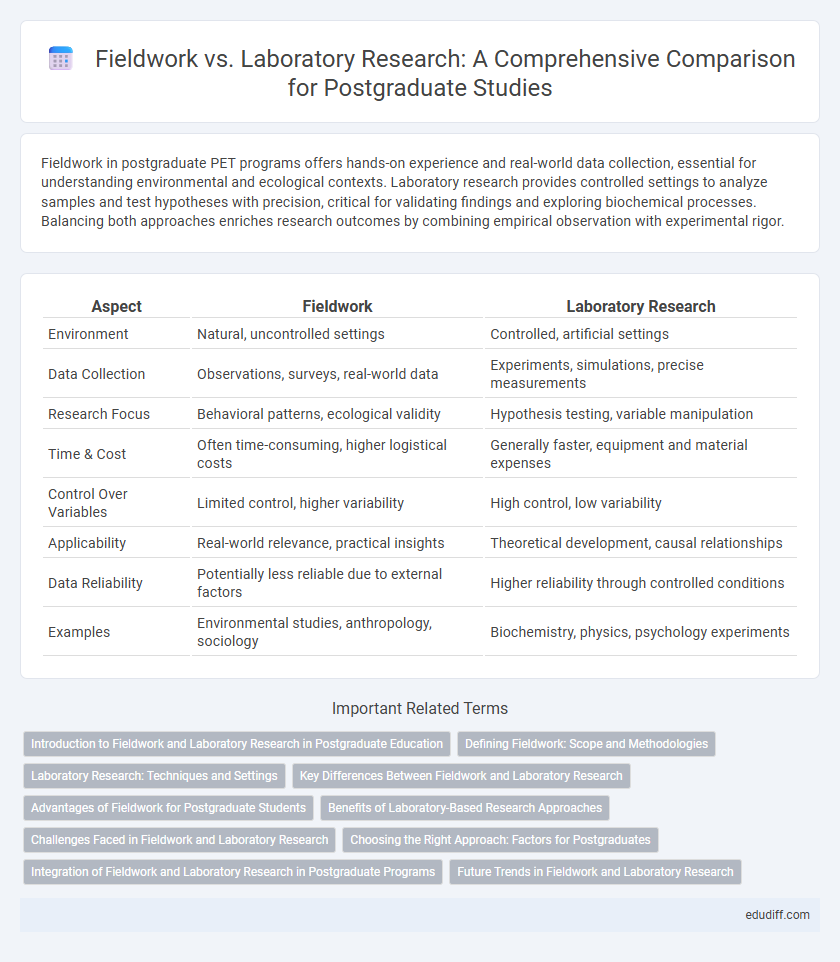Fieldwork in postgraduate PET programs offers hands-on experience and real-world data collection, essential for understanding environmental and ecological contexts. Laboratory research provides controlled settings to analyze samples and test hypotheses with precision, critical for validating findings and exploring biochemical processes. Balancing both approaches enriches research outcomes by combining empirical observation with experimental rigor.
Table of Comparison
| Aspect | Fieldwork | Laboratory Research |
|---|---|---|
| Environment | Natural, uncontrolled settings | Controlled, artificial settings |
| Data Collection | Observations, surveys, real-world data | Experiments, simulations, precise measurements |
| Research Focus | Behavioral patterns, ecological validity | Hypothesis testing, variable manipulation |
| Time & Cost | Often time-consuming, higher logistical costs | Generally faster, equipment and material expenses |
| Control Over Variables | Limited control, higher variability | High control, low variability |
| Applicability | Real-world relevance, practical insights | Theoretical development, causal relationships |
| Data Reliability | Potentially less reliable due to external factors | Higher reliability through controlled conditions |
| Examples | Environmental studies, anthropology, sociology | Biochemistry, physics, psychology experiments |
Introduction to Fieldwork and Laboratory Research in Postgraduate Education
Fieldwork in postgraduate education involves direct data collection in natural settings, fostering experiential learning and real-world application of theoretical knowledge. Laboratory research emphasizes controlled experimentation and precise data analysis, enabling reproducibility and hypothesis testing in a structured environment. Both methodologies are essential for developing comprehensive research skills and advancing scholarly expertise in specialized academic disciplines.
Defining Fieldwork: Scope and Methodologies
Fieldwork in postgraduate research encompasses data collection activities conducted in real-world environments outside controlled laboratory settings, integrating qualitative and quantitative methodologies such as participant observation, surveys, and ethnographic studies. It allows for contextualized understanding of phenomena within natural settings, emphasizing direct interaction with subjects, ecological validity, and adaptive data-gathering techniques. Methodologies in fieldwork prioritize situational responsiveness, triangulation of data sources, and reflexivity to address complex variables inherent in the field environment.
Laboratory Research: Techniques and Settings
Laboratory research in postgraduate studies employs controlled environments to ensure precise measurement and reproducibility, using advanced techniques such as spectroscopy, chromatography, and molecular assays. These settings facilitate systematic manipulation of variables and detailed observation of phenomena that are often unachievable in fieldwork. The integration of state-of-the-art equipment and software enhances data accuracy and supports complex experimental designs crucial for developing innovative scientific insights.
Key Differences Between Fieldwork and Laboratory Research
Fieldwork involves collecting data in natural environments, allowing researchers to observe phenomena in real-world contexts, whereas laboratory research is conducted in controlled settings that enable precise manipulation of variables. Fieldwork often deals with complex, dynamic systems with less control over external factors, making it ideal for exploratory studies, while laboratory research excels in hypothesis testing and replication due to its standardized conditions. The choice between fieldwork and laboratory research depends on the research objectives, availability of resources, and the need for ecological validity versus experimental control.
Advantages of Fieldwork for Postgraduate Students
Fieldwork offers postgraduate students experiential learning through direct engagement with real-world environments, fostering critical observational and analytical skills that are not easily replicated in laboratory settings. It enhances contextual understanding by allowing students to collect primary data influenced by natural variability and complex social interactions, improving the applicability of their research findings. Exposure to fieldwork also cultivates adaptability and problem-solving abilities, essential competencies for advanced research and professional development in diverse academic disciplines.
Benefits of Laboratory-Based Research Approaches
Laboratory-based research approaches provide postgraduate students with controlled environments that enhance experimental precision and reproducibility, enabling accurate data collection and analysis. These methods facilitate the use of advanced instrumentation and technologies that are often unavailable in field settings, supporting detailed investigation of complex phenomena. Controlled laboratory conditions also minimize external variables, improving the validity of findings and accelerating hypothesis testing.
Challenges Faced in Fieldwork and Laboratory Research
Fieldwork challenges often include unpredictable environmental conditions, logistical difficulties, and limited control over variables, complicating data collection and consistency. Laboratory research faces obstacles such as maintaining precise experimental conditions, equipment malfunctions, and potential biases introduced through controlled settings. Both methods demand rigorous planning and adaptability to ensure valid and reliable postgraduate research outcomes.
Choosing the Right Approach: Factors for Postgraduates
Postgraduates must consider the research objectives, available resources, and environmental variables when choosing between fieldwork and laboratory research. Fieldwork offers real-world data collection in natural settings, ideal for ecological or sociological studies, while laboratory research provides controlled conditions suited for experimental precision and repeatability. Balancing these factors ensures methodological rigor and relevance to the specific postgraduate research goals.
Integration of Fieldwork and Laboratory Research in Postgraduate Programs
Postgraduate programs increasingly emphasize the integration of fieldwork and laboratory research to enhance empirical data collection and experimental validation. Combining field observations with controlled lab analyses enables comprehensive understanding and innovation in disciplines such as environmental science, archaeology, and biology. This interdisciplinary approach fosters critical thinking and practical skills essential for advanced academic and professional research.
Future Trends in Fieldwork and Laboratory Research
Future trends in postgraduate research emphasize the integration of advanced technologies such as remote sensing, AI-driven data analysis, and portable lab equipment, facilitating more efficient and precise fieldwork. Laboratory research increasingly incorporates automation, high-throughput screening, and computational modeling to accelerate experimentation and enhance reproducibility. The convergence of fieldwork and laboratory techniques is expected to foster interdisciplinary approaches, enabling comprehensive data collection and analysis for complex scientific challenges.
Fieldwork vs Laboratory Research Infographic

 edudiff.com
edudiff.com